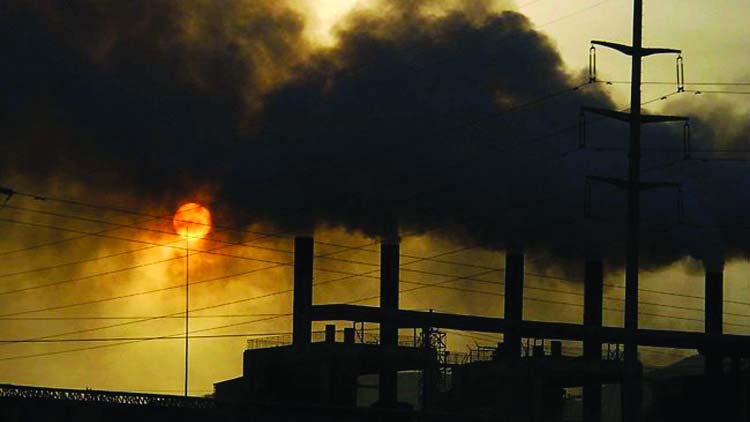
UNB, Khulna :
Unauthorised lead factories are springing up in different parts of the city keeping both the environment and public health in a perilous state.
Without following any rules and regulations, at least 35 such factories have grown up here. These factories are releasing toxic hazardous chemical substances to the detriment of human health and environment. Lead is removed from old batteries in the dark of night in various places of these factories.
According to specialists, poisonous substances from lead increase the risks of respiratory and heart diseases and cancer.
If an animal eats grass from a grassing ground beside any such factory, it might fall sick or die. In investigation, it has been seen that, the number of easy-bike (Human hauler) has been increased in the city.
Local sources attributed the mushrooming of lead factories in the city areas to the introduction of battery-run easy-bikes in a large number.
Illegal lead factories have mostly been established in Rupsha, Lobonchara, Tentultola, Surikhali, Hogladangha, Solmari, Aronghata, Bil Pabla, Rayermohol and Shiromoni areas. Abdul Majid, worker of a lead factory in Shiromoni area, said they collect average 22-23 kg lead from a disposed battery of bus or truck and average 6-7 kg lead from a battery of an easy-bike.
Kazi Mahadi, owner of Everest Metal and Battery, claimed that his factory has license and they work at night as it is difficult to separate lead and wastes in the daylight. That is way, they melt lead at night.
Saiful Islam, a resident of Surikhali area, said the lead factories remain closed during the daytime.
The workers start their works at night and close the factories before the sunrise. When lead is melted at night, it becomes very hard for the residents of the area to take breath.
Saiful Islam added green leaves of the trees in the area have become pale due to pollution by the lead factories.
Yeasin Ali Sardar, civil surgeon of Khulna, said while lead is melted in high temperature, highly reactive gases such as carbon monoxide, sulfur dioxide and carbon dioxide are produced, spreading over around one kilometre area, causing harmful effects for human health and environment.
District livestock officer Syed Mohammad Anwarul Islam said toxic lead with ash often flies down into the land beside and it does not change the place.
If humans or animals eat the vegetables or grass produced in the land, they will fall sick. Twelve cows died in Buro Moulovir Dorga area in 2007 reportedly because of this. Doctor Mollick Hossain, director of the Department of Environment in Khulna, said at least lead 35 factories have been established in the city.
Unauthorised lead factories are springing up in different parts of the city keeping both the environment and public health in a perilous state.
Without following any rules and regulations, at least 35 such factories have grown up here. These factories are releasing toxic hazardous chemical substances to the detriment of human health and environment. Lead is removed from old batteries in the dark of night in various places of these factories.
According to specialists, poisonous substances from lead increase the risks of respiratory and heart diseases and cancer.
If an animal eats grass from a grassing ground beside any such factory, it might fall sick or die. In investigation, it has been seen that, the number of easy-bike (Human hauler) has been increased in the city.
Local sources attributed the mushrooming of lead factories in the city areas to the introduction of battery-run easy-bikes in a large number.
Illegal lead factories have mostly been established in Rupsha, Lobonchara, Tentultola, Surikhali, Hogladangha, Solmari, Aronghata, Bil Pabla, Rayermohol and Shiromoni areas. Abdul Majid, worker of a lead factory in Shiromoni area, said they collect average 22-23 kg lead from a disposed battery of bus or truck and average 6-7 kg lead from a battery of an easy-bike.
Kazi Mahadi, owner of Everest Metal and Battery, claimed that his factory has license and they work at night as it is difficult to separate lead and wastes in the daylight. That is way, they melt lead at night.
Saiful Islam, a resident of Surikhali area, said the lead factories remain closed during the daytime.
The workers start their works at night and close the factories before the sunrise. When lead is melted at night, it becomes very hard for the residents of the area to take breath.
Saiful Islam added green leaves of the trees in the area have become pale due to pollution by the lead factories.
Yeasin Ali Sardar, civil surgeon of Khulna, said while lead is melted in high temperature, highly reactive gases such as carbon monoxide, sulfur dioxide and carbon dioxide are produced, spreading over around one kilometre area, causing harmful effects for human health and environment.
District livestock officer Syed Mohammad Anwarul Islam said toxic lead with ash often flies down into the land beside and it does not change the place.
If humans or animals eat the vegetables or grass produced in the land, they will fall sick. Twelve cows died in Buro Moulovir Dorga area in 2007 reportedly because of this. Doctor Mollick Hossain, director of the Department of Environment in Khulna, said at least lead 35 factories have been established in the city.

